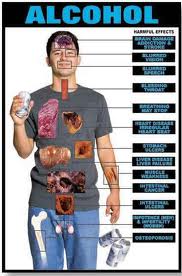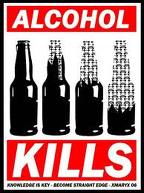
The Myth of Moderate Drinking
From Quran: a Reformist Translation, Endnote: 002:219
The root of the Arabic word we translated as “intoxicants” is KhaMaRa and it means “to cover.” If its first letter is read with Ha (9) rather than Kh (600), it then means Red, referring to red wine (For the usage of Hamar in the Bible, see Deuteronomy 32:14; Isaiah 27:2 Ezra 6:9; 7:22; Daniel 5:1-2,4). We prefer its common pronunciation. Some translations, while accepting the same pronunciation, have erroneously restricted the meaning of the word by translating it as “wine” or “liquor.” Consumption of all intoxicants, be they alcoholic beverages, drugs, crack, cocaine, heroin, etc. are covered by this prohibition. The harm inflicted to individual and society by alcoholic beverages, drugs and gambling is enormous. See 5:90-91.
The Quran does not prohibit alcoholic beverages or drugs legally, and thus does not suggest any punishment for mere usage of alcohol. Hadith books ordaining severe penalties for the consumption of alcohol contradict the Quranic jurisprudence, since people’s personal choices, how bad they may be, cannot be penalized by society. Society can only punish acts that are direct or proximate causes of harm to another person or persons. Besides, putting limitations on individual rights wastes society’s resources, increases corruption, hypocrisy, and underground criminal activities, and other crimes. Legally banning and criminalizing the consumption and production of alcohol, a liquid drug, at the turn of 20th century proved to be a bad idea. Similarly, criminalizing the consumption of other drugs is also a bad idea. Society’s resources should be used for the prevention and rehabilitation of these kinds of socially and psychologically caused addictions.
However, the Quran prohibits intoxicants to individuals for various reasons, including: moral (the designer and creator of your body and mind asks you not to intentionally harm the body lent to you for a lifetime), intellectual (the greatest gift you have is your brain and its power to make good judgment, so do not choose to be stupid or more stupid than you already are!) and pragmatic (you and your society will suffer grave loss of health, wealth, happiness, and many lives; do not contribute to the production and acceleration of such a destructive boomerang).
The common justification for using alcohol, “I drink in moderation,” is not convincing, since almost all those who suffer from alcohol abuse or its consequences such as drunk driving, had started with moderation, sip by sip, and gradually increased the dosage because of peers or uncontrollable events in their lives. Today’s moderate drinker may be tomorrow’s addict. Why take the chance, especially when it is not a necessity? Stupidity in moderation is not something to be justified, let alone glorified. Rational people should not subject themselves and the society to the grave risks inflicted by alcohol. Besides, moral people should not support an industry that hurts a big segment of the society. The anecdotal “research” results that are occasionally advertised by the media claiming that the usage of wine or alcohol in moderation to be healthy for the heart is suspect, since beer and wine companies are major supporters of the media through commercials.
 Many correlations are ignored by the so-called researchers. For instance, studying the impact of wine consumption on health, without taking into account the income, health insurance, diet, lifestyle, genetic make up, and environment of wine-drinkers, will not produce a reliable cause-and-effect relationship. Interestingly, some of the health benefits attributed to alcohol have been listed for grape juice, though in higher doses. Even if alcohol or any other drug had some economic, social and even health benefits, the Quran reminds us of the proven fact that their harms outweigh their benefits.
Many correlations are ignored by the so-called researchers. For instance, studying the impact of wine consumption on health, without taking into account the income, health insurance, diet, lifestyle, genetic make up, and environment of wine-drinkers, will not produce a reliable cause-and-effect relationship. Interestingly, some of the health benefits attributed to alcohol have been listed for grape juice, though in higher doses. Even if alcohol or any other drug had some economic, social and even health benefits, the Quran reminds us of the proven fact that their harms outweigh their benefits.
The Bible contains contradictory messages regarding the use of wine or alcoholic beverages. The Hebrew equivalent of the Quranic word Sakar (16:67; 4:43) is Shekar (intoxicant) and it is criticized by the Old Testament (Leviticus 10:9; Judges 13:4, Isaiah 28:7; Isaiah 5:11; 24:9; 29:9; 56:12; Joel 3:3; Amos 6:6; Pr 20:1; 31:6; Micah 2:11). Wine impairs the health, judgment and memory (1 Samuel 25:37; Hosea 4:11; Peter 31:4-5), inflames the passions (Isaiah 5:11), and leads to sorrow, contention and remorse (Peter 23:29-32). Wine also cheers God and man (Judges 9:13; Zechariah 9:17; Psalms 104:15; Esther 1:10; Ecclesiastes 10:19), and strengthens the body (2Samuel 16:2; Song 2:5).
Though the consumption of wine is occasionally approved and even encouraged through the daily sacrifice (Exodus 29:40-41), with the offering of the first-fruits (Leviticus 23:13), and with various other sacrifices (Numbers 15:4-10), the Bible also contains some prohibitions. For instance it prohibits wine for the Rechabites (Jeremiah 35:1-19), the Nazirites (Judges 13:7; Luke 1:15; 7:33), and the priests when engaged in their services (Leviticus 10:1, 9-11). It also lists wine as offerings of idolatry (Deuteronomy 32:37-38).
The Hebrew Bible uses about a dozen words to refer to different kinds of alcoholic beverages (Ashisha, Asis, Hemer, Enabh, Mesekh, Tirosh, Sobhe, Shekar, Yekebh, Shemarim, Mesek). However, some Biblical scholars limit the application of this prohibition by translating the Shekar as “strong drink.” The majority of Christian sects have no religious inhibition regarding the consumption of alcohol. Easton, a Jesus-worshipping tri-theist, writes: “Our Lord miraculously supplied wine at the marriage feast in Cana of Galilee (John 2:1-11).”
The New Testament also contains warnings for people against the excess consumption of intoxicants (Luke 21:34; Romans 13:13; Ephesians 5:18; 1 Timothy 3:8; Titus 1:7). But, in the same volume, we also see wine moving from lip to lip as a sacred drink. According to the Gospels, Jesus turns water to wine (John 4:46) and wine has a prominent place in Passover and the Last Supper. While Mark 15:23 serves Jesus wine in his last moments, Matthew 27:34 serves him vinegar. It is obvious that the Gospel authors could not differentiate between vinegar and wine.
The contradictory position regarding wine or alcoholic beverages reaches absurdity when Jesus allegedly declared wine to be memorials of his body and blood. The Book of Revelation, a theo-fictional nightmare, mixes wine with the numerically defined beast and hell fire. “And the third angel followed them, saying with a loud voice, If any man worship the beast and his image, and receive his mark in his forehead, or in his hand, The same shall drink of the wine of the wrath of God, which is poured out without mixture into the cup of his indignation; and he shall be tormented with fire and brimstone in the presence of the holy angels, and in the presence of the Lamb: And the smoke of their torment ascendeth up for ever and ever: and they have no rest day nor night, who worship the beast and his image, and whosoever receiveth the mark of his name” (Revelations 14:9-11).
It seems that the words grape juice, vinegar, literal wine, and metaphorical wine, may all be mixed up in the Bible due to some intentional tampering during its oral or written transmission, and the errors committed during translations of other translations.


